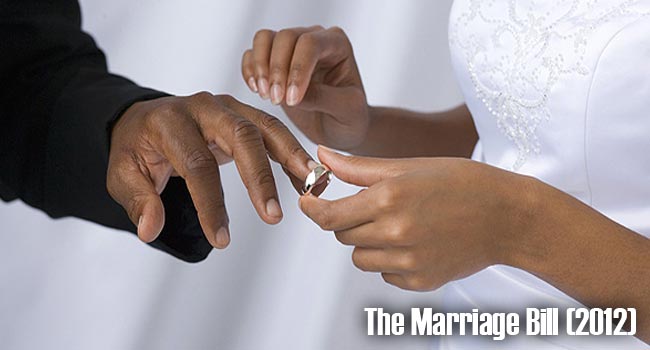The Marriage Bill (2012)

The Marriage Bill is currently undergoing internal review and stakeholder consultation. It is a Bill for an Act of Parliament that is meant to amend and consolidate the various laws relating to marriage and divorce and for connected purpose. Since the 21st of August 2012, the Commission for the Implementation of the Constitution (CIC) has been holding a plenary to deliberate on the Family Law Bills. The Plenary is amongst the final stages of deliberations before the bills are transmitted to the Attorney General for publication. This follows the incorporation into the bills the views expressed by the participants at various forums as well as those received in writing.
Among the key laws that the Commission for the Implementation of the Constitution, CIC received following the swearing in of Commissioners in January 2011 was the Family Law Bills (The Marriage Bill, The Matrimonial Property Bill and The Protection against Domestic Violence Bill). The Family Law Bills give effect to Article 45 of the Constitution which provides for family.
In the review process, CIC has facilitated stakeholder participation through technical and stakeholder forums, public forums in different counties and more recently a meeting with religious leaders and community elders to discuss the provisions on the Family Law Bills. The meeting brought together community elders from the Maasai, Gusii, Pokot, Ogiek and Kuria Communities as well as religious leaders from various denominations within the Christian Faith, Muslim, Hindu and Baha'i religious groups.
Among the key provisions that formed the basis for discussion in the various forums included but not limited to:
- Whether or not to retain the practice of Dowry Payment: The debate relating to payment of dowry was based on whether the law should provide for dowry payment as a compulsory measure. This was in light of the fact that article 45 of the Constitution recognizes marriages concluded under traditional system of which payment of dowry is one such recognized customary practice.
- Polygamous marriages: While the participants acknowledged the polygamous nature of some of the marriage systems, the push towards legislating for a system that will subsequently ensure implementation of monogamous marriages was evidenced by arguments put forward including reference to the Protocol on the African Charter on Human and People's Rights on the Rights of Women in Africa (Maputo Protocol) article 6 which provides that "monogamy is encouraged as the preferred form of marriage and that the rights of women in marriage and family, including in polygamous marital relationships are promoted and protected."
- Presumption of Marriage: Participants debated upon the provision on presumption of marriage arguing that recognition of cohabitation as a system of marriage where two parties have cohabited for two years and acquired the reputation of being husband and wife, as being contrary to religious teachings of marriage as a sacred covenant that can only be accorded by taking the vows of marriage. It was also proposed that presumption of marriage could be retained but protection measures put in place to protect the husband or wife from exploitation by either spouse.
- Protection of Family "members" against domestic violence: The participants also debated upon the scope of persons or members of the family that should be covered in protected by the law on protection against domestic violence.
It is our responsibility to ensure that social stability as well as economic development is protected by ensuring that the legislation passed promotes families as the building blocks of Kenyan society. This will promote democracy and good governance.


